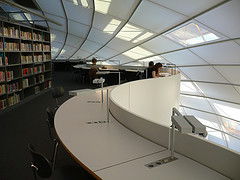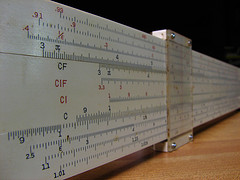December 21st, 2009 by Eugene Barsky | No Comments »

Here is my newest article – “A Library Journal Club as a Tool for Current Awareness and Open Communication: UBC case study” which oddly sees light online during the last week of 2009.
It is published in a free, open access, Canadian journal – Partnership: the Canadian Journal of Library and Information Practice and Research.
Photo by http://www.flickr.com/photos/svenwerk/
Posted in Main, People | No Comments »
December 15th, 2009 by Eugene Barsky | No Comments »

NYT today has an article on an issue of great importance to all science disciplines – data management. The article – “A Deluge of Data Shapes a New Era in Computing” overviews the new book published by Microsoft researchers – “The Fourth Paradigm: Data-Intensive Scientific Discovery.”
The book is available in full text from Microsoft here – http://research.microsoft.com/en-us/collaboration/fourthparadigm/4th_paradigm_book_complete_lr.pdf
This is a hot issue in science libraries too, as we are trying to understand how to deal with the vast amounts of digital data and whether libraries have a role to play to support, maintain and archive some of this data…
** photo by http://www.flickr.com/photos/nickwheeleroz/
Posted in Astronomy, Atmospheric Science, Chemical and Biological Engineering, Chemistry, Civil Engineering, Earth and Ocean Sciences, General Science, Geography, Main, Materials Engineering, Mathematics, Mechanical Engineering, Mining engineering, Physics, Science - undegraduate classes, Statistics, Wood Sciences | No Comments »
December 11th, 2009 by Kevin Lindstrom | No Comments »
Ron Simmer Patent and IP Expert has once agained issued his Patex Bizarre Patents Calendar.
This calendar documents the creative spirt of the human race reflected in patents.
Check out Ron’s excellent site of patent and intellectual property links at the Patex website.
Submitted by Kevin Lindstrom Science and Engineering Liaison Librarian
Posted in Amusing stuff, Astronomy, Atmospheric Science, Chemical and Biological Engineering, Chemistry, Civil Engineering, Earth and Ocean Sciences, General Science, Geography, Main, Materials Engineering, Mathematics, Mechanical Engineering, Mining engineering, News, People, Physics, Podcasts, Science - undegraduate classes, Statistics, Teaching, Uncategorized, Wood Sciences | No Comments »
December 3rd, 2009 by Eugene Barsky | No Comments »
Great news for UBC folks:
A new $23.2 million Network of Centres of Excellence (NCE) designed to advance Canada’s position as a global leader in new media, animation and games is to be hosted by the University of British Columbia.
The Graphics, Animation and New Media (GRAND) network will be headquartered at the Centre for Digital Media at Great Northern Way Campus (GNWC), a joint academic collaboration between UBC, Simon Fraser University, Emily Carr University of Art + Design and the British Columbia Institute of Technology.
GRAND will offer student learning and research opportunities and comprise 30 projects clustered around five themes: new media challenges and opportunities; games and interactive simulation; animation, graphics and imaging; and cross-cutting themes of social, legal, economic and cultural perspectives and enabling technologies and methodologies. The network will involve 50 investigators along with collaborating researchers and industry partners.
http://www.science.ubc.ca/news/334
Posted in Main, News, People, Science - undegraduate classes | No Comments »
November 17th, 2009 by Eugene Barsky | No Comments »
Please see below the backbone of our workshop. I don’t use those slides at the workshop, but they are useful as refer-to-later kind of material…
Posted in Main, Teaching | No Comments »
November 13th, 2009 by Kevin Lindstrom | No Comments »
Sociologist Joseph Hermanowicz’ new book Lives in Science How Institutions Affect Academic Careers describes how the prestige of academic institutions often shapes the career of the individual.
“For all but a handful of the scientists he studies, the prestige of their institution pretty much determines their professional–and even their personal–destiny. Of the more than 4000 institutions of higher learning in the United States where a scientist can get a faculty post–ranging from world-renowned research universities to local community colleges–only a very limited number possess the resources, reputation, and connections needed for research careers at the highest levels of recognition.”
Click here for a full review of Hermanowicz’ book.
Submitted by Kevin Lindstrom Physical Sciences and Engineering Liaison Librarian
Posted in Astronomy, Atmospheric Science, Chemical and Biological Engineering, Chemistry, Civil Engineering, Earth and Ocean Sciences, General Science, Geography, Main, Materials Engineering, Mathematics, Mechanical Engineering, Mining engineering, News, People, Physics, Science - undegraduate classes, Wood Sciences | No Comments »
November 12th, 2009 by Eugene Barsky | No Comments »
The newest issue of the Science has a short editorial titled “Becoming a Scientist“.
Personally, I found t his short piece to be very interested and not intuitive…take a look – http://www.sciencemag.org/cgi/content/full/326/5955/916?rss=1
Posted in Astronomy, Atmospheric Science, Chemical and Biological Engineering, Chemistry, Civil Engineering, Earth and Ocean Sciences, General Science, Geography, Main, Materials Engineering, Mathematics, Mechanical Engineering, Mining engineering, Physics, Science - undegraduate classes, Statistics, Wood Sciences | No Comments »
October 28th, 2009 by Eugene Barsky | No Comments »

Most of us spend our university education taking the standard, required courses, there are more than just the basics out there when it comes to some science classes.
This blog post list some of the most hilarious of them – http://www.onlineuniversities.com/blog/2009/10/100-hilarious-college-courses-that-really-exist/
Personally, I would love to take some of the science classes such as :
The Science of Superheroes: While it might sound like fun and games, this course takes superheroes as a means to teach students real lessons about physics. [U of California Irvine] or Lego Robotics: Legos can help you build more than just that TIE Fighter, they can also be used to make real robots, as this course will show students. [MIT]
** Photo by http://www.flickr.com/photos/jocorvera/
Posted in Amusing stuff, Astronomy, Atmospheric Science, Chemical and Biological Engineering, Chemistry, Civil Engineering, Earth and Ocean Sciences, General Science, Geography, Main, Materials Engineering, Mathematics, Mechanical Engineering, Mining engineering, Physics, Science - undegraduate classes, Statistics, Wood Sciences | No Comments »
October 21st, 2009 by Eugene Barsky | No Comments »

This month, ScienceWatch.com, has listed the ISI ranking in Computer Sciences by citations per paper—among countries that collected 5,000 or more citations during the period—to reveal weighted impact.
http://sciencewatch.com/dr/cou/2009/09octCOM/
“For articles with multiple authors from different nations, each nation receives full, not fractional, citation credit. Essential Science Indicators lists nations ranked in the top 50% for a field over a given period, based on total citations. In Computer Sciences, 79 nations are listed, meaning 158 were surveyed. 27 nations collected at least 5,000 citations during the period. The average citation rate for field of Computer Sciences is 3.14.”
It is great to see Canada listed as #8 (but after Scotland?)…
** photo by http://www.flickr.com/photos/rogersmith/
Posted in Main, News | No Comments »
October 9th, 2009 by Kevin Lindstrom | No Comments »
Good news regarding the UBC Library’s CISTI Orders Document Delivery Service. You no longer need to come to the Library to pick up your CISTI or Interlibrary Loan request.
For CISTI Orders articles, Interlibrary Loan staff are creating brief records in Relais (our ILL/DD software) in order to post the articles to the web and to send an email to the user. The article can be accessed a total of 3 times within 15 days from the date of the email message. After either accessing the article 3 times or 15 days have passed, the article is no longer available to the user.
Articles ordered from Interlibrary Loan are now being delivered to UBC users via post to web. When an article is received, Interlibrary Loan staff match the article to the correct request and then it is posted to the web. The user receives an email message with a link to the article. The user then clicks on the link to obtain the article. The user does not need a password to access their articles.
All articles received by 5:00PM Monday to Friday will be processed that day.
Under the Copyright Act, if the user wants to keep a copy of the article, they must print a copy. The article has been received for the purposoe of research or private study only. It is not for redistribution, retransmission or electronic storage. It cannot be used for any other purpose or reproduced without permission of the copyright owner.
Submitted by Kevin Lindstrom Science and Engineering Liaison Librarian
Posted in Earth and Ocean Sciences, General Science, Geography, Main, Materials Engineering, Mathematics, Mechanical Engineering, Mining engineering, News, Physics, Science - undegraduate classes, Statistics, Teaching, Uncategorized, Wood Sciences | No Comments »




